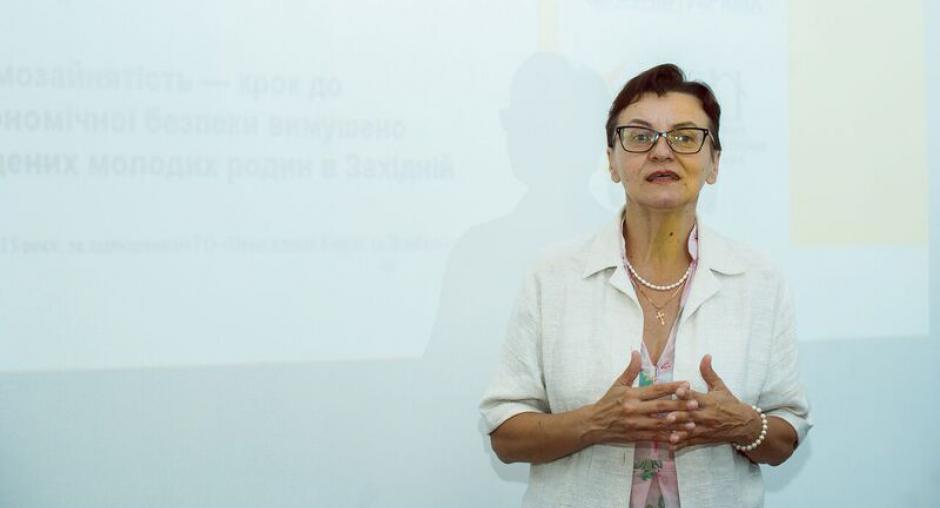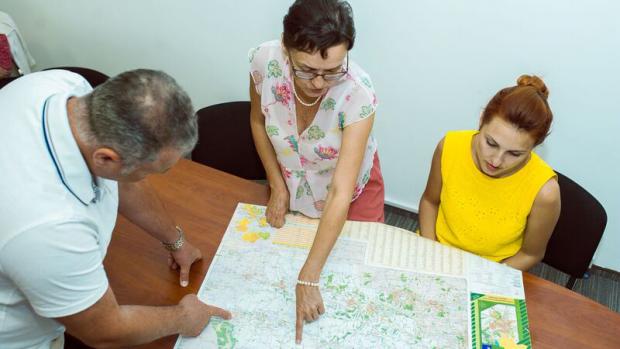Giving women a voice in peace-building
Enhancing the participation of women in conflict resolution and peace-building efforts is important to achieving security and stability in Ukraine.
Nataliya Mariychuk, a mother of three children aged three to eighteen is nostalgic for the life she had some 1,300 kilometres away in her native city of Alchevsk, in Luhansk region but now she has adjusted to her new life.
At the other end of Ukraine, in the village of Vorotsiv in Lviv region.
Nataliya is one of more than a million women displaced by the conflict in eastern Ukraine. The significant number of internally displaced persons (IDPs) and the challenges involved in integrating them into their new environments prompted her to co-found the Civic Movement of Donbas IDPs.
The association works with local administrative authorities in Vorotsiv to address socio-economic problems including lack of housing and recreational facilities for children. They also work to build bridges between IDPs and their host communities in western Ukraine, where tensions have risen following the influx of people from the east.
“We offered the local authorities our volunteer support with initiatives such as cleaning up the local river, enhancing the road system and purchasing sports equipment for youngsters”, says Nataliya. “These efforts helped IDPs to better integrate into the local community and helped host communities see us as partners and not rivals”.
Women IDPs in Ukraine
- The number of IDPs in Ukraine is 1.8 million, according to Ukraine’s Ministry for Social Policy as of July 2016;
- Of this figure, 1.1 million are women (61 per cent);
- Women make up 73 per cent of IDPs residing in collective centres, according to Global Shelter Cluster figures as of May 2016. Collective centres are pre-existing buildings and structures intended for the long-term stay of IDPs. They include dormitories and sanatoriums, modular-type centres and rented houses.
Nadiya Kuramshina is another woman pushing the boundaries with her work.
The mother of a soldier in the Ukrainian Armed Forces and the founder of the non-governmental organization (NGO) Unity of Mothers “Zakhyst” (Defence), Kuramshina works to establish contacts between women whose sons serve in the Ukrainian Armed Forces and the mothers whose son have become armed members of “Donetsk People’s Republic”.
“For many of us, it is important to learn the views of the other side first-hand and to talk about the things that we have in common”, says Nadiya. “With very little outside help, we are working on delivering legal and social support to soldiers who have returned from the army and face difficulties in adjusting to civilian life.”
Women, Peace and Security
According to journalist Tamara Zlobina, despite these accomplishments women’s achievements in Ukraine continue to be seen through a patriarchal prism emphasizing the traditional role of women as caregivers instead of focusing on their contributions to peace-building efforts. “There are strong stereotypes about the role of women in society which significantly prevents them from realizing their full potential”, she says.
There are strong stereotypes about the role of women in society, which significantly prevents them from realizing their full potential.
Tamara Zlobina Journalist
Awareness of this fact has led international organizations such as the OSCE, through its Special Monitoring Mission to Ukraine (SMM), to seek structures and foundations upon which to build and strengthen opportunities for women.
This work is based on United Nations Security Council Resolution 1325 (2000) on Women, Peace and Security (UNSCR 1325/2000) which recognized that men and women are affected by conflicts in different ways and that peace-building efforts must see the full involvement of both women and men.
The Mission also incorporates gender perspectives into facilitating dialogue, monitoring and reporting along the lines of its mandate.
Gender Dimensions of SMM’s Monitoring: One Year of Progress
This report sets out the gender-mainstreaming efforts of the OSCE Special Monitoring Mission to Ukraine (SMM) and outlines the relevant gender dimensions of the SMM’s monitoring, reporting and dialogue facilitation activities.
See all the links
Laura Jaffrey, an SMM monitoring officer and gender focal point based in Lviv says that one approach to gender mainstreaming in the SMM’s work is to collect sex-disaggregated data. “In practical terms it involves talking with people of both sexes, of different ages and from different social spheres in order to reveal the realities faced by both women and men of different ages and backgrounds”, says Laura.
In practical terms, it implies talking with people of both sexes, of different ages and from different social spheres in order to reveal the realities faced by both women and men of different ages and backgrounds.
Laura Jaffrey SMM Monitoring Officer
Within its mandate the SMM monitors the changes in gender dynamics regarding and including the challenges faced by IDPs. Monitoring through the gender lens can shed light on specific issues encountered by women, men, boys and girls and reveal a more accurate picture of the situation on the ground, according to Laura.
Breadwinners and politicians
The conflict is transforming the role of women. “Due to the compulsory mobilization of men into the army, women are left to supporting the families financially”, says Tamara.
Olena Cherenkova, an IDP from Luhansk, fled to Lutsk in Volyn region, with her 80-year-old mother and her teenage daughter. As her family’s sole breadwinner, Olena has gained a sense of confidence and independence which sees her challenging the traditional stereotypes of women in her work as the head of the local association of IDPs from Crimea and Donbas.
On the other hand, Vira Pidhrushna saw her opportunity in politics and less than a year ago became the deputy head of the Brody village council in Lviv region. Focusing on the needs of families, her work has resulted in providing assistance to people returning to the area from combat duty in the east.
“I am very proud of my party for trusting me to lead the party list in the local elections”, says Vira, acknowledging that only five of the 34 deputies in the district council are women.
Women will not be able to make much progress in achieving gender equality if they do it on their own, it has to be a joint effort by women and men.
Nataliya Mariychuk Co-Founder of the Civic Movement of Donbas IDPs
Yet both she and Nataliya from Vorotsiv village emphasize that women and men should not be competitors in their professional endeavours.
“Women will not be able to make much progress in achieving gender equality if they do it on their own”, says Nataliya. “It has to be a joint effort by both women and men”.
Giving women a real say in peace-building would certainly contribute to enhancing gender equality in a post-conflict society.






